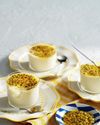
At the end of a winding country road, about an hour south of Berlin, stands a sign proclaiming: ‘Welcome to the Kingdom of Germany.’ I scan the horizon for fairytale castles, oompah bands and tables groaning beneath beer and bratwurst, but there’s little to see here beyond a cluster of slightly drab buildings. Since 1918, when Wilhelm II, the last Kaiser, was driven into exile, most Germans have assumed that they lived in a republic, but today a new and unsettling kind of ‘monarchy’ is taking root.
The Kingdom, headquartered in a former chicken-canning factory near the small town of Wittenberg, issues its own currency, passports and driving licences, and contends that the ‘other’ Germany – the federal state established after World War II – is a gigantic confidence trick that has cheated the country’s near 85 million people out of their birthright.
In recent years, several other breakaway mini-states have sprung up around Germany, and the number of people joining them is soaring. Many members of the Reichsbürger [Citizens of the Reich] movement are united in wanting to dissolve modern Germany entirely and rebuild the old Imperial state, created in 1871, often intent on placing a new Kaiser at the helm, too. But their manifesto goes beyond a romantic harking back to pomp and ceremony, and into what many see as a menacing underworld of extremism and demagoguery.
Any doubts about the Reichsbürger movement’s seriousness were dispelled last December when 25 of its members were arrested in a wave of police raids. Several of those seized were accused of plotting an armed attack on the German parliament, which they hoped would ignite a national uprising.
This story is from the August 2023 edition of The Australian Women's Weekly.
Start your 7-day Magzter GOLD free trial to access thousands of curated premium stories, and 9,000+ magazines and newspapers.
Already a subscriber ? Sign In
This story is from the August 2023 edition of The Australian Women's Weekly.
Start your 7-day Magzter GOLD free trial to access thousands of curated premium stories, and 9,000+ magazines and newspapers.
Already a subscriber? Sign In

Maggie's kitchen
Maggie Beer's delicious veg patties - perfect for lunch, dinner or a snack - plus a simple nostalgic pudding with fresh passionfruit.

Reclaim your brain
Attention span short? Thoughts foggy? Memory full of gaps? Brigid Moss investigates the latest ways to sharpen your thinking.

The girls from Oz
Melbourne music teacher Judith Curphey challenged the patriarchy when she started Australia's first all-girls choir. Forty years later that bold vision has 6500 members, life-changing programs and a new branch of the sisterhood in Singapore.

One kid can change the world
In 2018, 10-year-old Jack Berne started A Fiver for a Farmer to raise funds for drought relief. He and mum Prue share what happened next.

AFTER THE WAVE
Twenty years ago, the Boxing Day tsunami tore across the Indian Ocean, shredding towns, villages and holiday resorts, and killing hundreds of thousands of people from Indonesia to Africa. Three Australians share their memories of terror, loss and survival with The Weekly.

PATRICIA KARVELAS How childhood tragedy shaped me
Patricia Karvelas hustled hard to chase her dreams, but it wasn't easy. In a deeply personal interview, the ABC host talks about family loss, finding love, battles fought and motherhood.

Ripe for the picking
Buy a kilo or two of fresh Australian apricots because they're at their peak sweetness now and take inspiration from our lush recipe ideas that showcase this divine stone fruit.

Your stars for 2025
The Weekly’s astrologer, Lilith Rocha, reveals what’s in store for your astrological sign in 2025. For your monthly horoscope, turn to page 192.

MEL SCHILLING Cancer made me look at myself differently'
One year on from going public with her bowel cancer diagnosis, Mel Schilling reveals where she's at with her health journey and how it's changed her irrevocably.

Nothing like this Dame Judi
A few weeks before her 90th birthday, the acting legend jumped on a phone call with The Weekly to talk about her extraordinary life – and what’s still to come.